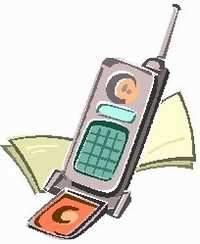Sat, Aug 09, 2008
Not Surprisingly, Older Flyers More Likely To Be Opposed To
Idea
 Americans are divided on whether cell phones should be allowed
during flights, with people age 65 and older more likely to oppose
their use than those between 18 and 34, according to a new Bureau
of Transportation Statistics (BTS) special report using survey data
on opinions about the transportation system.
Americans are divided on whether cell phones should be allowed
during flights, with people age 65 and older more likely to oppose
their use than those between 18 and 34, according to a new Bureau
of Transportation Statistics (BTS) special report using survey data
on opinions about the transportation system.
BTS, a part of the US Department of Transportation's Research
and Innovative Technology Administration, reported that four out of
10 US residents (39.7 percent) responded in November 2007 that
passengers should definitely or probably be allowed to use cell
phones if there were no interference issues with aircraft
communications systems. Slightly less than half (45.2 percent) said
they definitely or probably should not be used. The remaining 15
percent said they weren't sure.
The report uses data from BTS' annual Omnibus Household Survey
conducted in November 2006 and November 2007. The margin of error
for the 2007 cell phone questions is 3.1 percent.
Younger respondents were most likely to support cell phone use.
In 2007, almost half (47.7 percent) of respondents between 18 and
34 said passengers should definitely or probably be allowed to use
cell phones while fewer than four out of 10 (36.1 percent) said
they definitely or probably should not be used. The remaining 16
percent said that they weren't sure.
Among those over age 65, about one out of four (26.6 percent)
said passengers should definitely or probably be allowed to use
cell phones while more than half (56.7 percent) said they
definitely or probably should not be used. The remaining 17 percent
said that they weren't sure.
The opinions of those aged 35-64 fell between those of the other
groups. Four out of 10 (40.3 percent) said passengers should
definitely or probably be allowed to use cell phones while less
than half (45.6 percent) said they definitely or probably should
not be used. The remaining 14 percent said that they weren't
sure.
The special report, Opinions on Cell Phone Use on Airplanes,
Congestion, and Telecommuting—from the 2006 and 2007
Omnibus Household Survey, is available at the FMI link below.
More News
Also: Vertical Flight Society, NBAA Maintenance Conference, GA Honored, AMT Scholarship For the first time, students from Embry-Riddle’s Daytona Beach, Florida, campus took t>[...]
Hazardous Weather Information Summary of significant meteorological information (SIGMET/WS), convective significant meteorological information (convective SIGMET/WST), urgent pilot>[...]
"The need for innovation at speed and scale is greater than ever. The X-62A VISTA is a crucial platform in our efforts to develop, test and integrate AI, as well as to establish AI>[...]
(FAA) Inspector Observed That Both Fuel Tanks Were Intact And That Only A Minimal Amount Of Fuel Remained In Each Analysis: According to the pilot, approximately 8 miles from the d>[...]
“Pyka’s Pelican Cargo is unlike any other UAS solution on the market for contested logistics. We assessed a number of leading capabilities and concluded that the Pelica>[...]
 Airborne-Flight Training 05.09.24: ERAU at AIAA, LIFT Diamond Buy, Epic A&P
Airborne-Flight Training 05.09.24: ERAU at AIAA, LIFT Diamond Buy, Epic A&P ANN's Daily Aero-Term (05.07.24): Hazardous Weather Information
ANN's Daily Aero-Term (05.07.24): Hazardous Weather Information Aero-News: Quote of the Day (05.07.24)
Aero-News: Quote of the Day (05.07.24) NTSB Final Report: Cessna 150
NTSB Final Report: Cessna 150 Aero-News: Quote of the Day (05.08.24)
Aero-News: Quote of the Day (05.08.24)



